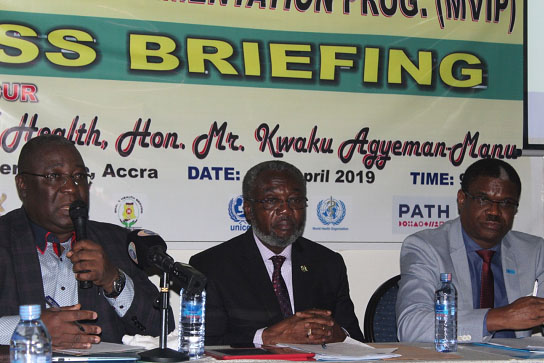From left: Dr. Badu Sarkodie, Dr. Anthony Nsiah-Asare and Dr. Owen Kaluwa, WHO representative in Ghana
The Ghana Health Service (GHS) with support from the World Health Organisation (WHO) and development partners will from May 2019 begin the pilot implementation of malaria vaccine in selected regions of the country.
The vaccine ? RTS,S/ASO1 also known as Mosquirix? an injectable developed to protect against the malaria causing P. falciparum parasite, will be administered to infants aged five to nine months in a three-dose schedule, followed by a fourth dose 15 to 18 months later.
The vaccine will start from the Central, Oti, Volta, Bono, Bono East and Ahafo regions, as part of the country’s routine immunisation programme before being scaled up to other regions in the future.
Dr. Badu Sarkodie, Director, Public Health Division, GHS, who gave an overview of the programme at a press briefing in Accra, said 120,000 to 150,000 infants are targeted to have the vaccine per year for the next two to three years.
“At least 50,000 malaria cases are expected to be averted and approximately 750 children expected to be saved from dying in the intervention areas,” he added.
Justifying the need for the introduction of the vaccine, Dr. Sarkodie stated that the burden of malaria in the country was till high despite several interventions, adding that Ghana stands to benefit from deploying additional tools and technology in malaria control and elimination stages.
“Vaccination is a proven effective intervention against disease elimination; RTS,S malaria vaccine is a potential public health tool for malaria control,” he said.
Dr. Anthony Nsiah-Asare, Director General GHS, said Ghana opted to join Kenya and Malawi to lead the pilot introduction of the vaccine after a successful pilot in 2013.
He hinted that the GHS had already taken delivery of 400,000 doses of the first batch which will be administered at no cost to Ghanaians.
The GHS director general assured that all the necessary steps, including approval from the Food & Drugs Authority (FDA), have been made for the administration of the vaccines.
“We have assessed and ensured adequate capacity of the country’s cold chain and injection waste management. As with other new vaccines and in line with national regulations, we will continue to monitor the safety profile of the RTS,S as done for all the other vaccines within the routine immunisation programme,” he reassured.
By Jamila Akweley Okertchiri


